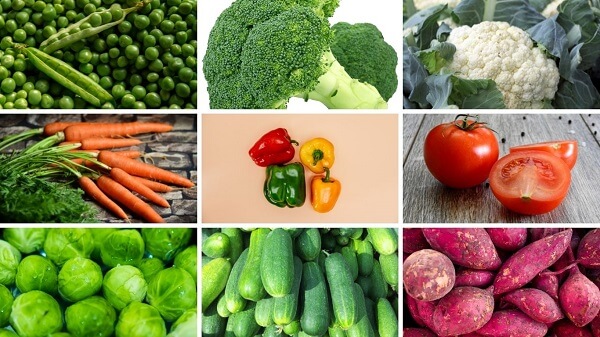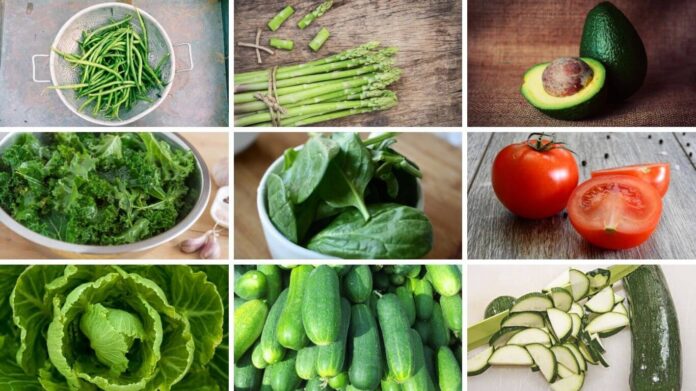Last Updated on December 14, 2022 by Sultana Parvin
Many people think that they need to completely cut out all carbohydrates and sugars from their diet when it comes to weight loss. While this may help you lose weight in the short term, it is not a sustainable diet in the long term. Some people try t reduce their weight by cutting down calories from their daily intake,
It is again unwise because, by reducing calories, your health and physic will become weaker day by day. Therefore, you should plan for a diet that will keep you healthy and maintain the required calorie and nutrient intake for your sound physic.
Vegetables are a great source of vitamins and minerals, fiber, and antioxidants. They also contain water, which helps us stay hydrated. The key is to choose vegetables low in carbohydrates and sugars and high in nutrients. Here comes the question of what are the best vegetables for weight loss.
Deciding which vegetables are best for losing weight is not about knowing the best choice for your diet. It’s more about learning which vegetables are safe to eat and which gives you more vitamins, minerals, fiber. At the same time, an appropriate quantity of vegetables and other foods are to be decided by the number of calories you need to keep you healthy and fit.
You can eat a healthier diet keeping some good vegetables and fruits in your meal but still enjoy some of your favorite foods. For example, you might choose whole fruit instead of juice for breakfast, a healthy salad, and some good vegetables with your rice or pasta instead of a shop-bought pizza during lunch.
Table of Contents
The benefits of eating vegetables for weight loss
Some vitamins and minerals are more effective at cleansing the body of toxins than others. For example, vitamin C is at least as effective as alcohol at removing toxins from the brain, and some researchers believe that vitamin C may be more effective than alcohol at removing toxins from the body overall.
As well as leading to osteoporosis, not getting enough calcium in your diet can also contribute to anxiety, depression, and sleep difficulties. Whatever your age or gender, it’s important to eat enough calcium to help keep your bones healthy.
Some vegetables are high in calcium, while others are low in calcium. If you are carbonated, it may be helpful to select a diet that includes many of the following vegetables: broccoli, Brussels sprouts, spinach, and cauliflowers. All of these are high in calcium.
Which vegetables are best for weight loss?
The old proverb, “narrowing it down,” applies here. You want to choose the healthiest vegetables possible, but you also want to enjoy them often, so choose wisely and avoid foods that are too high in calories or carbs.
Many people think that vegetables are the way to go when counting calories. However, things are not that straightforward. For many people, certain types of vegetables are better for weight loss than others.
Here are some of the best Vegetables for weight loss
While some vegetables are better for weight loss than others, you should eat various vegetables to ensure that you are getting all the required nutrients you need. Try not to be overly focused on losing weight but rather on shifting your diet to a more nutritious plan.

1. Broccoli
Broccoli contains more vitamin K than any other food on earth, so it can help your body use calcium properly. It’s also loaded with folate, which has been linked to lower rates of heart disease.
2. Cauliflower
Cauliflower is another good choice because it’s one of the few vegetables that doesn’t have much calories or fat. A cup of cauliflower only contains about 30 calories and less than 1 gram of fat. But it is highly rich in antioxidants and vitamins.
3. Brussels Sprouts
Brussels sprouts are another vegetable rich in nutrients and relatively low in calories. The serving size of Brussel sprouts contains just 40 calories and 3 grams of protein.
4. Green Beans
Green beans are an excellent source of fiber, potassium, and folic acid. Potassium is very important for maintaining muscle mass as we age. Folic acid plays a role in DNA synthesis and cell division. So, eating plenty of green beans could be helpful if you want to maintain strong bones.
5. Asparagus
Asparagus is loaded with vitamin B6 and manganese, two nutrients that may help boost energy levels. It’s not too high in calories, either — just 20 calories per cup.
6. Eggplant
Eggplants are packed with fiber, vitamin C, and iron. They’re also low in calories (just 15 calories per half-cup serving) and sodium (about 90 milligrams).
7. Avocado
Avocados are rich in healthy fats and fiber, making them a great addition to salads. But avocados don’t come without their own set of benefits. Eating avocados regularly has been shown to reduce bad cholesterol and increase good cholesterol.
8. Sweet Potato
Sweet potatoes are loaded with beta carotene, which converts into vitamin A in our bodies. This nutrient is essential for vision, bone growth, immune system health, and reproductive functions.
9. Tomato
Tomatoes are high in lycopene, which reduces the risk of prostate cancer. Lycopene also boosts immunity and fights inflammation throughout the body.
10. Lettuce
Lettuce is a great source of vitamins A and K, which play roles in blood clotting and bone health. One small head of romaine lettuce provides over 100 percent of daily Vitamin K requirements.
11. Bell Pepper
Bell peppers are high in vitamin C and fiber, and they provide a nice dose of vitamin A. Bell peppers are one of the best sources of this powerful antioxidant.
12. Zucchini
Zucchinis are extremely versatile and can be used in many different ways. You can sauté them, grill them, make zoodles, or even add them to soups. Just remember that they’re higher in carbs than most other summer squash, so keep that in mind.
13. Summer Squash
Summer squashes like zucchini and yellow crookneck are surprisingly high in certain types of antioxidants called flavonoids. These compounds give summer squashes their beautiful colors and textures, but recent studies show that flavonoids may also offer protection against heart disease and cancer.
14. Winter Squash
Winter squashes like acorn and butternut are delicious when cooked properly. There’s no need to peel them or remove the seeds – cut them up, toss them with oil, salt, pepper, and maybe some garlic from time to time.
15. Carrot
Carrots are pretty much always going to be a part of any meal, snack, or dessert. Loaded with beta-carotene, carrots help protect your eyes by reducing the risk of macular degeneration and cataracts. They’re also a great source of fiber.
16. Peas
Peas are loaded with vitamin B6, folate, fiber, and potassium. Plus, peas are an excellent source of protein. Add them to your next stir fry or serve them fresh off the stove as a side dish.
17. Spinach
Spinach is healthy for you! Two cups of spinach are only 10 calories and provide tons of nutrition. Spinach is an excellent source of nutrition. It contains high amounts of vitamins and minerals. It also provides a lot of energy and iron.
18. Seaweed
A cup of raw seaweed contains about 30 calories and provides a lot of nutrition. Seaweed is extremely nutritious. It contains lots of vitamins and minerals, including iron, magnesium, vitamin C, riboflavin, vitamin K, and high folic acid and iodide levels.
19. Kale
Kale has gotten a bad rap. Many people think it’s a “weedy” green. But, kale offers a lot of nutritional benefits. It’s very low in calories (about 3 per cup) and fat, making it a perfect food during periods of dieting or intense exercise. Kale is rich in calcium, iron, magnesium, and vitamins A and C. This dark leafy green contains phytonutrients called glucosinolates that detoxify carcinogens and protect cells from free radical damage.
20. Cucumber
Cucumbers are full of water, fiber, and electrolytes and are a good source of vitamins and minerals. The skin is edible, so don’t shy away if you’re not fond of cucumbers’ texture.
How to add vegetables to your diet for weight loss
Incorporating more vegetables into your diet is a great way to start if you’re looking to lose weight. Vegetables are low in calories and high in nutrients, making them the perfect food for weight loss. Here are a few tips for making your vegetable diet work for weight loss:
1. Start by adding one or two vegetables to your regular diet. Gradually add more vegetables over time until you’re eating a balanced diet that includes several different types of vegetables.
2. Focus on filling up vegetables rather than on other foods. Vegetables are low in calories and high in nutrients, so they’ll help you feel full without adding too many calories to your diet.
3. Plan ahead. When you know what you’re going to eat, it’s easier to make healthy choices. Plan out your meals ahead of time and include plenty of vegetables.
4. Experiment with different vegetables. There are many different types of vegetables, so you’re sure to find the best for you.
There is no one “best” vegetable that is universally recommended for weight loss. However, some vegetables that can help weight loss include cruciferous vegetables like broccoli and cauliflower, dark leafy greens like spinach and kale, and cucumbers. These vegetables are all low in calories but high in nutrients, which can help to promote weight loss. Additionally, incorporating various vegetables into your diet is a good way to get a variety of important nutrients.
The best vegetables for weight loss are low in calorie density and high in nutrient density.
Check for Weight loss supplements.
